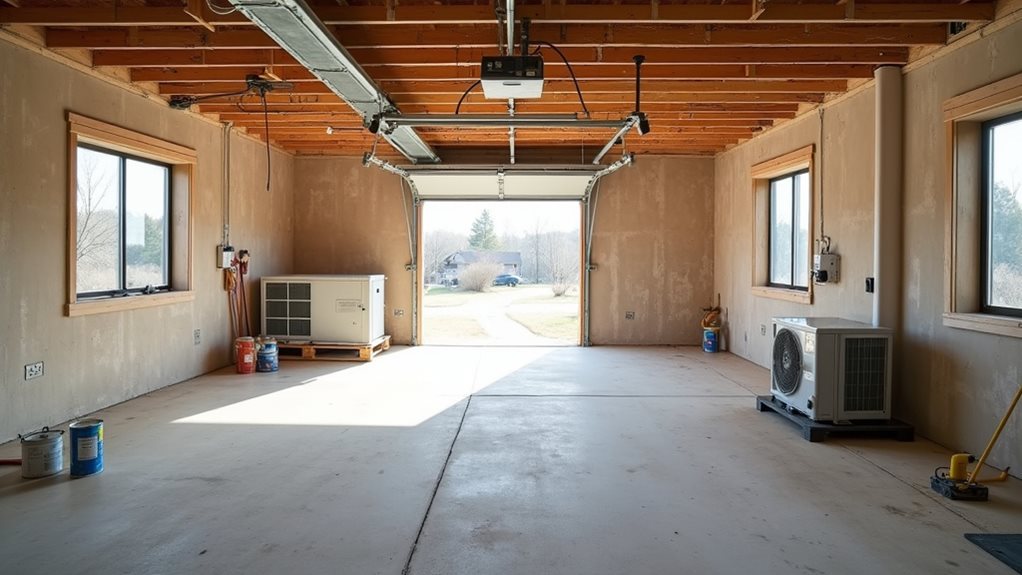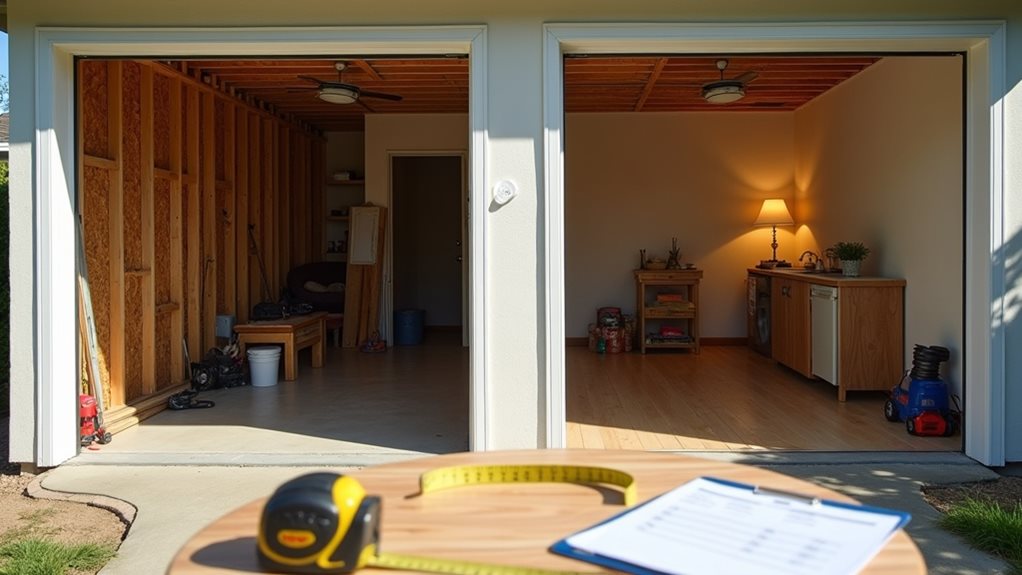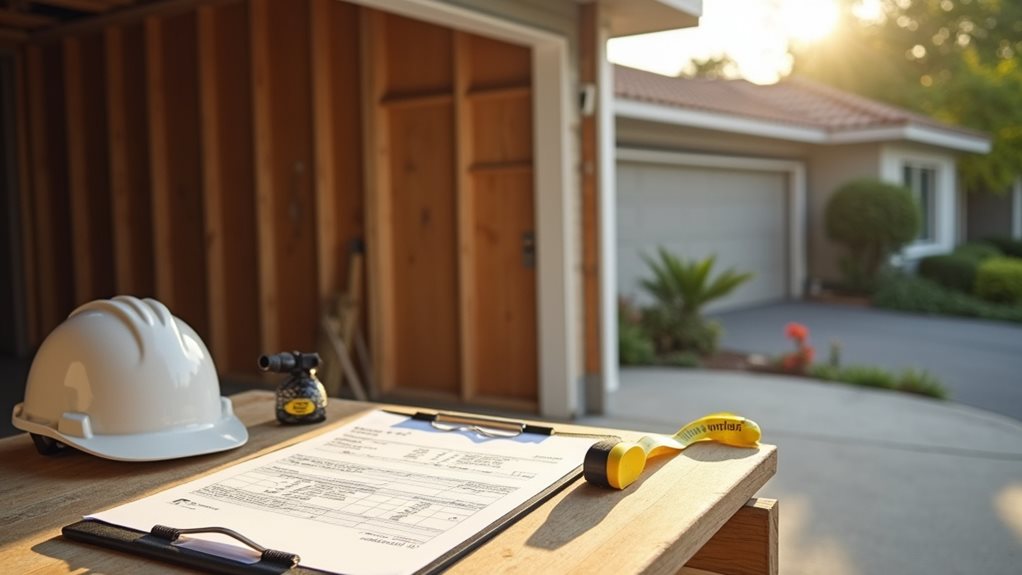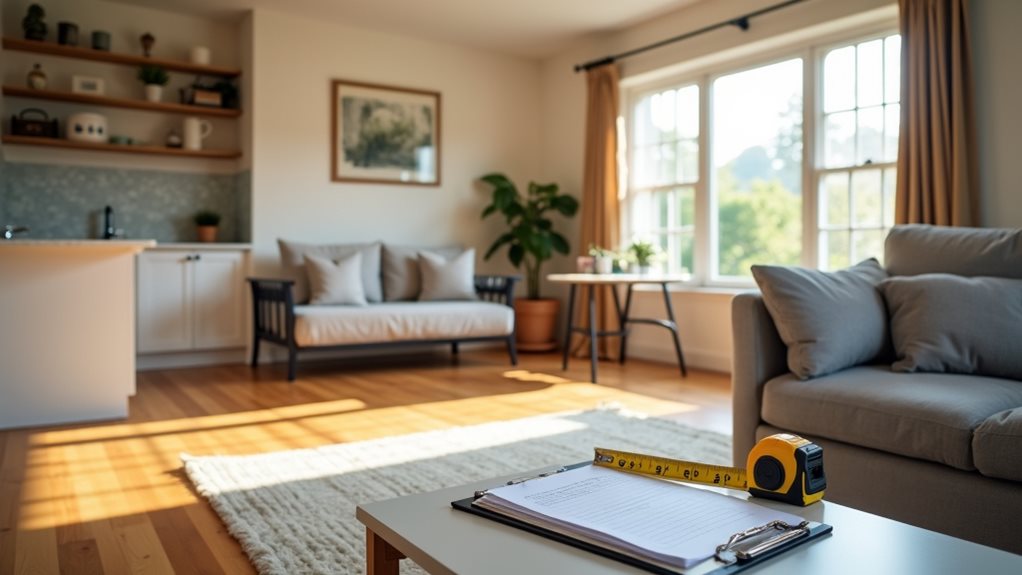You can expect a garage conversion to cost roughly $5,000 on the low end for a basic insulated living space to $75,000+ for mid‑ to high‑end remodels with plumbing or structural changes, with national averages commonly near $10,000–$50,000. Major drivers are electrical, HVAC, foundation and permit work, plus regional labor rates. Plan a 10–20% contingency, get multiple bids, and check local codes for accurate pricing—more detail follows if you keep going.
TLDR
- National garage conversion averages range roughly $9,659–$51,659, with small projects near $3,000–$17,000.
- Basic insulated conversions typically cost $5,000–$10,000; standard full conversions $10,000–$30,000.
- Adding a bathroom or kitchen raises costs to $30,000–$75,000, while high-end projects exceed $75,000.
- Major cost drivers: structural/foundation work, electrical/HVAC/plumbing, doors/windows, insulation, and permits.
- Budget contingencies of 10–20% plus permit fees ($300–$3,000+) are recommended for unexpected issues.
Typical Cost Ranges for Garage Conversions

Although costs vary widely by scope and region, you can expect a garage conversion to range from modest, budget-friendly work to a sizable investment if you add plumbing, kitchens, or full ADU features. You’ll typically see national averages around $9,659–$51,659, with small bedroom or office conversions near $3,000–$17,000, one- and two-car ranges differing, and ADUs often costing $50,000+. Additionally, wiring costs can contribute significantly to the overall expenses, with estimates for wiring a shop ranging from $3,000 to $8,000. Keep in mind that most conversions take 2–6 weeks from start to finish, not including any permit approval time.
Major Cost Components to Budget For
When budgeting for a garage conversion, you’ll need to account for electrical and wiring work, which can include new circuits, panel upgrades, outlets, and lighting to meet code and support appliances or HVAC systems.
Structural and foundation work—such as reinforcing load-bearing walls, adding headers for new openings, repairing or leveling foundations, and modifying roof or floor framing—can quickly become one of the largest line items depending on the extent of modifications. Ensuring that the floor can support heavy loads, such as a safe, is crucial, with most residential floors designed to handle 1000 pounds if the weight is properly distributed.
Planning for both systems early helps you avoid costly change orders and guarantees the converted space will be safe, functional, and up to local inspection standards. Be sure to also factor in permit and inspection fees, which are typically required in San Diego and can add several thousand dollars to the overall budget.
Electrical and Wiring
Plan your electrical work carefully, because wiring and panel upgrades are often one of the biggest and most code-sensitive expenses in a garage conversion.
Expect wiring runs to cost about $248–$299 each, permits $150–$500, and panel upgrades $3,000–$10,000.
Detached garages raise costs for new feeds, labor varies by region, and include outlets, lighting, GFCIs, inspections, and coordination with utilities.
Structural and Foundation
Because the foundation carries the full load of your converted garage, you should budget carefully for the type of footing and any required reinforcements, since costs can vary widely from about $5 to $37 per square foot and typical jobs run $2,000–$7,000 for one- to three-car garages.
Assess soil, frost depth, slab or stem wall choice, materials, labor, permits, and contingencies.
Cost Breakdown by Conversion Type

Although costs can vary widely by location and scope, breaking down garage conversion expenses by type helps you set realistic budgets and priorities, since a simple cosmetic update differs sharply from a full ADU build-out. Simple conversions run $500–$5,000 for cosmetic work; bedroom conversions typically cost $5,000–$17,000; full remodels $3,000–$17,000; ADUs range $20,000 to over $100,000 with major systems. Additionally, incorporating elements like white flowers with yellow centers can enhance the aesthetic appeal of your converted space.
Cost Per Square Foot Expectations
When you estimate cost per square foot for a garage conversion, expect a broad low-end range around $10 to $30 for basic finishes and partial upgrades, a mid-range commonly between $18 and $50 for full living conversions with standard finishes, and high-end projects—especially ADUs with premium materials and systems—pushing well above $75 and sometimes into the $150–$300 range.
Those numbers reflect differences in scope, material quality, and required systems like plumbing, electrical, and HVAC, so your actual per-foot price will hinge on those choices and local labor rates.
To budget accurately, compare these tiers against your garage size and planned scope, then factor in permit, inspection, and structural or utility upgrade costs that can raise the per-square-foot total.
Low-End Price Range
If you’re aiming to keep costs down, low-end garage conversions typically run from roughly $1 to $30 per square foot depending on scope, with the very cheapest cosmetic work — like painting, floor resurfacing, or swapping doors — often falling in the $1–$10/ft² band and full-but-basic remodels clustering around $10–$30/ft².
You’ll rely on inexpensive materials, DIY or light labor, minimal permits, and avoid major structural, mechanical, or utility work to stay within a $500–$5,000 budget for small garages.
Mid-Range Averages
Moving up from basic cosmetic fixes and DIY-friendly updates, mid-range garage conversions step into more all-encompassing work that makes the space livable and code-compliant without using high-end fixtures or custom finishes.
You can expect roughly $18–$50 per sq ft nationally, while West Coast markets often run $125–$300; costs reflect electrical, HVAC, insulation, structural work, windows, permits, and labor.
High-End Finishes
Because high-end finishes demand premium materials, skilled trades, and often bespoke systems, you should expect costs to jump to roughly $150–$300 per square foot for a luxury garage conversion.
You’ll pay more for hardwood or stone floors, quartz counters, upgraded windows, custom cabinetry, and advanced HVAC or smart-home systems; labor, permits, and designer fees drive totals that can reach six figures in premium markets.
Regional Price Variations and Local Factors
While regional labor, material availability, local regulations, and market demand might seem like separate concerns, they combine to shape the true cost of converting a garage in ways you won’t always see on a basic estimate.
You’ll pay more in high-cost metros for labor, specialty trades, and shipped materials, while remote or regulated areas can add infrastructure, zoning, or design premiums that inflate budgets.
Permit, Inspection, and Regulatory Costs

If you’re converting a garage, expect permit, inspection, and regulatory costs to be a meaningful line item that can add thousands to your budget, because local fees, required inspections, and zoning reviews together shape both price and schedule.
Permit fees typically range $300–$3,000, inspections $300–$1,000, and zoning or plan-review costs $500–$1,500; specialized or multiple permits raise totals.
Common Unexpected Expenses and How to Avoid Them
When you convert a garage, hidden structural repairs like weakened joists, foundation settling, or noncompliant framing can quickly add thousands to your estimate unless you have a thorough pre-demolition inspection and engineer sign-off.
Electrical surprises — old wiring, inadequate panels, or missing grounding — often require rewiring or panel upgrades, so plan for an electrician’s assessment and include contingencies of at least 10–20% for labor overruns.
Finally, permit and code problems can force costly retrofits or delays, so pull the right permits early, confirm egress, fire, and insulation requirements with your inspector, and budget for any mandated upgrades.
Hidden Structural Repairs
Because demolition often reveals what’s been hidden for decades, garage-to-living-space projects commonly encounter structural surprises that can materially raise costs, and you need to plan for them early.
Expect foundation cracks, rotten framing, moisture or mold, and weakened roof members; budget for slab repair, reframing, insulation, vapor barriers, and occasional hazardous material abatement.
Have a contingency fund and hire a structural inspector before work starts.
Electrical Surprises
Hidden structural problems often go hand-in-hand with electrical surprises, since opening walls and ceilings exposes wiring, panels, and junctions that may be unsafe or undersized for the new intended use.
You can face panel upgrades, full rewires, GFCI and surge protection installs, or long wiring runs for detached garages.
Get a licensed electrician’s written scope, plan loads early, and budget contingencies.
Permit and Code Problems
While permit and code issues may seem like paperwork, they frequently become the costliest surprises in a garage conversion, adding delays, redesigns, and fees that can substantially exceed your initial estimates.
Budget $1,200–$2,000 nationally (more in cities), plan for inspections and zoning fees, and hire a local pro to steer variances, speed approvals, and avoid costly rework or fines.
Financing Options and Cost Management Strategies
Getting the right financing can make or break a garage-to-living-space conversion, so you’ll want to weigh options that match your equity position, timeline, and risk tolerance.
Assess home equity loans, HELOCs, and cash-out refinance if you have substantial equity, or consider personal or RenoFi-style renovation loans when you don’t.
Compare rates, fees, repayment terms, and combine sources to optimize cost and flexibility.
Return on Investment and Home Value Impact

A well-executed garage conversion can be a smart way to increase your home’s usable square footage and its market value, but you should expect returns to vary widely—typically between about 45% and 80% of the project cost, with top-tier results in competitive metro markets or areas with strong rental demand.
It can raise resale value ~10–20%, enhance rental income, and improve marketability, yet loss of parking may limit appeal.
Steps to Get Accurate Estimates and Hire Contractors
Start by assembling accurate measurements, clear goals, and the right questions so you can get estimates that reflect the true scope of your garage conversion; measure the space precisely, decide whether you’ll add plumbing or HVAC, and note structural concerns like foundation, roofline, or load-bearing walls that could drive costs.
Then get multiple detailed quotes, verify licenses and insurance, confirm permit handling, and set a clear contract.
Final Note
You can plan a successful garage conversion by budgeting for structural work, insulation, utilities and permits, while also accounting for regional price differences and unexpected costs like moisture issues or electrical upgrades. Get multiple detailed estimates, verify contractor credentials, and consider financing options that fit your timeline. Prioritize energy efficiency and code compliance to protect value, and track expenses closely so the project stays on schedule and delivers the best possible return on investment.